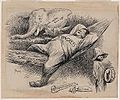Equal Protection Clause facts for kids
The Equal Protection Clause is an important part of the Fourteenth Amendment of the U.S. Constitution. This rule started in 1868. It says that no state can stop any person in its area from having "the equal protection of the laws." This means everyone should be treated fairly by the laws.
What is Equal Protection?
The Equal Protection Clause makes sure that laws are applied fairly to everyone. It means that governments cannot make laws that treat different groups of people unfairly without a very good reason. This helps protect people's rights and ensures justice for all.
How it Applies to States
At first, the Equal Protection Clause only applied to the federal government. But in 1954, the Supreme Court made a big decision in a case called Bolling v. Sharpe. They said that the idea of equal protection also applies to state and local governments. This was done through another part of the Constitution, called the Fifth Amendment's Due Process Clause. This means states must also treat all people equally under their laws.
Why it Matters
The Equal Protection Clause is very important for civil rights in the United States. It has been used in many court cases to fight against unfair treatment. It helps make sure that people are not discriminated against because of things like their race, religion, or other personal traits. It's a key part of making sure everyone has a fair chance and is treated with respect.
Images for kids
-
Congressman John Bingham of Ohio helped write the Equal Protection Clause.
See also
 In Spanish: Cláusula sobre protección igualitaria para niños
In Spanish: Cláusula sobre protección igualitaria para niños
 | Tommie Smith |
 | Simone Manuel |
 | Shani Davis |
 | Simone Biles |
 | Alice Coachman |



